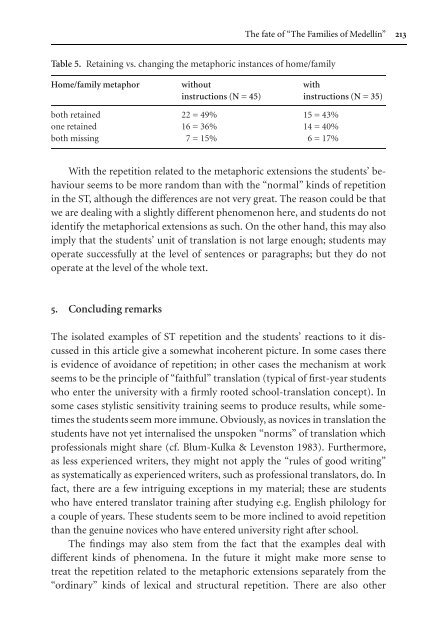Translation Universals.pdf - ymerleksi - home
Translation Universals.pdf - ymerleksi - home
Translation Universals.pdf - ymerleksi - home
Create successful ePaper yourself
Turn your PDF publications into a flip-book with our unique Google optimized e-Paper software.
Thefateof“TheFamiliesofMedellín” 213<br />
Table 5. Retaining vs. changing the metaphoric instances of <strong>home</strong>/family<br />
Home/family metaphor without with<br />
instructions (N = 45) instructions (N = 35)<br />
both retained 22 = 49% 15 = 43%<br />
one retained 16 = 36% 14 = 40%<br />
both missing 7 = 15% 6 = 17%<br />
With the repetition related to the metaphoric extensions the students’ behaviour<br />
seems to be more random than with the “normal” kinds of repetition<br />
in the ST, although the differences are not very great. The reason could be that<br />
we are dealing with a slightly different phenomenon here, and students do not<br />
identify the metaphorical extensions as such. On the other hand, this may also<br />
imply that the students’ unit of translation is not large enough; students may<br />
operate successfully at the level of sentences or paragraphs; but they do not<br />
operate at the level of the whole text.<br />
5. Concluding remarks<br />
The isolated examples of ST repetition and the students’ reactions to it discussed<br />
in this article give a somewhat incoherent picture. In some cases there<br />
is evidence of avoidance of repetition; in other cases the mechanism at work<br />
seems to be the principle of “faithful” translation (typical of first-year students<br />
who enter the university with a firmly rooted school-translation concept). In<br />
some cases stylistic sensitivity training seems to produce results, while sometimes<br />
the students seem more immune. Obviously, as novices in translation the<br />
students have not yet internalised the unspoken “norms” of translation which<br />
professionals might share (cf. Blum-Kulka & Levenston 1983). Furthermore,<br />
as less experienced writers, they might not apply the “rules of good writing”<br />
as systematically as experienced writers, such as professional translators, do. In<br />
fact, there are a few intriguing exceptions in my material; these are students<br />
who have entered translator training after studying e.g. English philology for<br />
a couple of years. These students seem to be more inclined to avoid repetition<br />
than the genuine novices who have entered university right after school.<br />
The findings may also stem from the fact that the examples deal with<br />
different kinds of phenomena. In the future it might make more sense to<br />
treat the repetition related to the metaphoric extensions separately from the<br />
“ordinary” kinds of lexical and structural repetition. There are also other
















